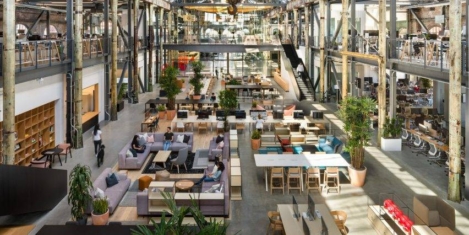November 29, 2018
New workplace trends will bring people back to the office, Gensler report suggests
 The next generation of office buildings will draw employees back to the workplace, a new report from architect and design firm Gensler suggests. It suggest that an increased number of employees are set to be drawn back to the office, as the importance and power of face-to-face interaction grows, and office design increasingly caters towards this. This year’s 2018 Design Forecast report, Shaping the Future of Cities (registration required), created by the Gensler Research Institute explores over 200 of the latest trends that are changing cities across the world. The overarching prediction is that design will “put people back at the centre” and become the driving force behind resilient, liveable cities. Buildings that react and respond to the people within it will be critical to the workplace experience, harnessing data to interpret internal workplace data and make intelligent adaptations.
The next generation of office buildings will draw employees back to the workplace, a new report from architect and design firm Gensler suggests. It suggest that an increased number of employees are set to be drawn back to the office, as the importance and power of face-to-face interaction grows, and office design increasingly caters towards this. This year’s 2018 Design Forecast report, Shaping the Future of Cities (registration required), created by the Gensler Research Institute explores over 200 of the latest trends that are changing cities across the world. The overarching prediction is that design will “put people back at the centre” and become the driving force behind resilient, liveable cities. Buildings that react and respond to the people within it will be critical to the workplace experience, harnessing data to interpret internal workplace data and make intelligent adaptations.








 A new task group spearheaded by the UK Green Building Council (UKGBC) being launched which will develop an industry-led definition for net zero carbon buildings. The task group brings together over thirty experts from across the building value chain and is being supported by 12 leading industry bodies. Following the recent IPCC report and the Paris Climate Agreement, worldwide attention has switched to achieving “net zero emissions” to escape the worst impacts of climate change. To answer this, a global campaign is being led by the World Green Building Council – calling for all new buildings to be net zero carbon in operation by 2030 and all existing buildings to achieve this standard by 2050. Its aim is to build industry consensus on a definition for net zero carbon buildings, which can then be used to advise project designs, planning requirements and building regulations.
A new task group spearheaded by the UK Green Building Council (UKGBC) being launched which will develop an industry-led definition for net zero carbon buildings. The task group brings together over thirty experts from across the building value chain and is being supported by 12 leading industry bodies. Following the recent IPCC report and the Paris Climate Agreement, worldwide attention has switched to achieving “net zero emissions” to escape the worst impacts of climate change. To answer this, a global campaign is being led by the World Green Building Council – calling for all new buildings to be net zero carbon in operation by 2030 and all existing buildings to achieve this standard by 2050. Its aim is to build industry consensus on a definition for net zero carbon buildings, which can then be used to advise project designs, planning requirements and building regulations.




 A new report has been published which argues that FM has the power, and responsibility to contribute towards social, economic and political betterment, but to do so the sector needs to be more explicit in the value it offers. Sustainability in facilities management: A Holistic View’ from Active Workplace Solutions claims to explore sustainability within the built environment, analyses how the facilities management (FM) sector can impact wider environmental, social and economic goals and build a holistic strategic picture of sustainability.
A new report has been published which argues that FM has the power, and responsibility to contribute towards social, economic and political betterment, but to do so the sector needs to be more explicit in the value it offers. Sustainability in facilities management: A Holistic View’ from Active Workplace Solutions claims to explore sustainability within the built environment, analyses how the facilities management (FM) sector can impact wider environmental, social and economic goals and build a holistic strategic picture of sustainability. 




 One year on from #MeToo – just one in four workers agree that international media coverage has helped to improve their workplace culture, according to new research on sexual harassment from Acas. The workplace experts commissioned the study from YouGov to find out whether media reporting on #MeToo and high-profile celebrity cases have had any effect on British workplaces. Only a third (30 percent) of survey respondents believe that incidents of sexual harassment in workplaces have decreased in the last five years.
One year on from #MeToo – just one in four workers agree that international media coverage has helped to improve their workplace culture, according to new research on sexual harassment from Acas. The workplace experts commissioned the study from YouGov to find out whether media reporting on #MeToo and high-profile celebrity cases have had any effect on British workplaces. Only a third (30 percent) of survey respondents believe that incidents of sexual harassment in workplaces have decreased in the last five years. 















